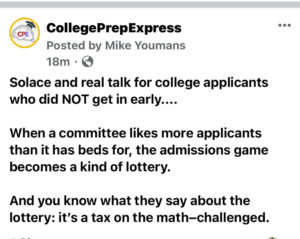Wrong reaction! I mean, there are no wrong FEELINGS, but if you’re THINKING that getting deferred is bad news, think again!
Today’s insanely stingy admissions rates, many below 10% even for early application (Harvard was around 3% last year, 2023), are NOT fake news. These single digit numbers are VERY REAL.
Obviously, you were hoping to get in since you applied in November, and especially since you applied EARLY, but understand what getting deferred actually means in the college admissions game. It means two things in particular, and they’re both good news:
- You did NOT get denied; you’re still in the running. The fat lady is NOT singing yet. Not even warming up. A deferral means the committee is STILL considering your candidacy and wants to look at your application alongside the pool of regular applicants. If you weren’t qualified in some way, you’d have been denied. Many, many of your peers were.
- Since you did NOT get denied, you can assume you meet all of the college’s academic, personal, extracurricular, community service and any other standards. Congratulations, you made the grade!
Despite that good news, I also want to suggest your application work is not yet done—you know, as you likely thought it was the day you clicked Submit way back in November. Nevertheless, try to view it as an opportunity: Sometimes a final effort is what makes the difference, so now is no time to give up! Here ARE things you can and should do to remain competitive in the deferred and regular applicant pool.
- First, read your deferral decision notifications very carefully and determine precisely what the college is asking you to do moving forward. Some colleges might request specific information, such as updated grade reports or test scores. Other colleges might encourage students to submit additional materials like recommendation letters, updates on extracurricular activities, or a deferral letter of intent to continue in the application process. It’s probably a good idea to meet with your school counselor to make absolutely sure you’re following all their directions correctly, because not doing so could easily quash your chances in the regular round.
- Talk to your school counselor about whether s/he has spoken to anyone in your college’s admissions office about or has any insight into how best to convert your deferral into an acceptance. Are there any weak links in your original application—from academics and intellectual interests to athletics to clubs and organizations to school spirit to community service—which can be strengthened over the winter and early spring?
- Compose a deferral letter to send a few weeks before final decisions are made. It’s important to send only ONE such letter—otherwise, you’ll come across as annoying, no bueno—so do not pull the trigger too soon! You may be eager to dash off a note before the first of the year to demonstrate just how enthusiastic you remain about attending, but you will be short-shrifting yourself: many positive experiences, new insights, achievements, and honors may happen January through March. Moreover, since most regular decisions are finalized mid-April-ish in 2020s’ admissions, you don’t want to send a letter so soon that the committee will have forgotten you by decision-making time, when you WANT to be in their pre-frontal cortex. Write a brief letter (don’t waste an admissions officers’ time!) addressed to the representative at the college who evaluates applicants from your high school (often a Regional Director) and cc: the Director of Admissions. Your letter should:
- Open by asserting your continued commitment to and enthusiasm about the college as your top choice school and explicitly state that if you are admitted in the spring, you intend to enroll; or, if that’s not necessarily the case, say that you are likely to enroll. Rather than express disappointment the way SO MANY deferred students do, be grateful you’re still being considered and write with a positive tone.
- Update the college on any relevant accomplishments and achievements you may have accrued, both in and out of the classroom, since you first submitted. Maybe your grades have dramatically improved in one or more subjects; maybe you discovered a new intellectual interest you can’t wait to explore more deeply in college; maybe you assumed a new leadership role involving new responsibilities or something noteworthy happened in an activity, sport, or community service pursuit; maybe your received the highest score on the ACT or SAT, or one of its sections, or on an SAT Subject Test.
- End by restating your main reasons that particular college fits your academic and personal goals for your undergraduate education better than any other school on your list. Be SPECIFIC to demonstrate your knowledge of the school.
- Consider updating anything you don’t love from your original application. Families who come to CollegePrepExpress after a deferral often benefit from an application review, during which Dr. Yo often identifies factors that can turn a December deferral into a January (EDII and EAII) or April (Regular) acceptance. We identify areas of the application that can be corrected or rewritten for future applications, especially in the Activities and Writing sections, and we can determine whether you need to send supplementary information to any schools. It’s important to resist overloading the admissions office with new material. Consult with your high school college counselor before sending in any extra materials, so you only send in what is absolutely necessary.
- Visit campuses where you’ve been deferred, if possible, to continue demonstrating informed interest. If you have not yet visited a college that defers you, take the opportunity to visit the campus in January or February. A campus visit not only shows your demonstrated informed interest, but also gives you an opportunity to talk to admissions officers, faculty, and students. During your campus visit, try to do the following:
- Meet face-to-face meeting with your admissions representative whenever possible.
- Sit in on classes and, if you’re you’re inspired or even if you’re not. meet with the professor, or other faculty, before or after class.
- Have lunch or a snack at a campus eatery to meet and speak with current students.
- Don’t forget about or neglect your regular decision applications while trying to improve your admission chances at an early college. Take time to address the deferral(s) and then, having learned from your experience in the college admissions game to date, do your very best work on your regular applications!
If you need additional help addressing a deferral decision, schedule a consultation with Dr. Yo. We’re here to help!


